What happens now that a deal's been done?published at 18:49 GMT 30 December 2020
The UK and EU begin a new relationship on 1 January 2021.
Read MoreDay starts with Home Office questions
Urgent question on sale of Opel-Vauxhall
Statement on Sky/21st Century Fox merger
Vehicle Technology and Aviation Bill to be debated
Peers start with oral questions
Move onto Higher Education and Research Bill
Work and Pensions Committee investigating PIPs
Kate Whannel and Esther Webber
The UK and EU begin a new relationship on 1 January 2021.
Read MoreHigher Education and Research Bill
 House of Lords
House of Lords
Parliament
Peers vote 128 to 36 to reject a Labour amendment which would require the Office for Students to make arrangements for students to be offered alternative places if their higher education provider ceases to operate.
That concludes Monday in the Lords.
Unusually, peers return at 11am on Tuesday for an extended report-stage debate on the bill enabling the government to activate Article 50.
Higher Education and Research Bill
 House of Lords
House of Lords
Parliament
Peers are voting on a Labour amendment which would require the Office for Students to make arrangements for students to be offered alternative places if their higher education provider ceases to operate.
Higher Education and Research Bill
 House of Lords
House of Lords
Parliament
Government spokesman Lord Young says the existing protections for students in the bill "go further than ever before".
He argues that setting out options for students' protection if their universities are suspended could cause them unnecessary concern.
Higher Education and Research Bill
 House of Lords
House of Lords
Parliament
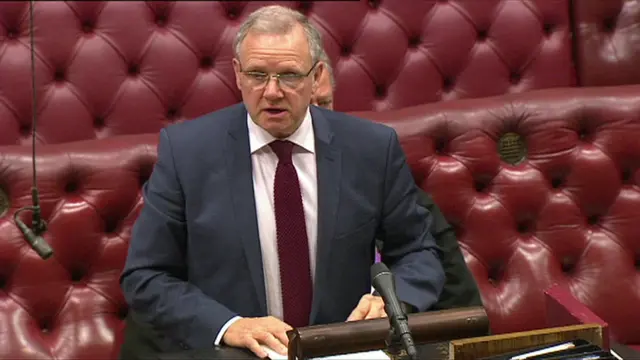
Labour education spokesman Lord Watson of Invergowrie introduces an amendment which would require the bill to specify what happens to existing students if their institution is suspended.
He refers to the government's earlier assertion that students are at the centre of the bill's reforms.
Crossbench peers Baroness Wolf of Dulwich and Lord Bilimoria also lend their support.
 House of Commons
House of Commons
Parliament
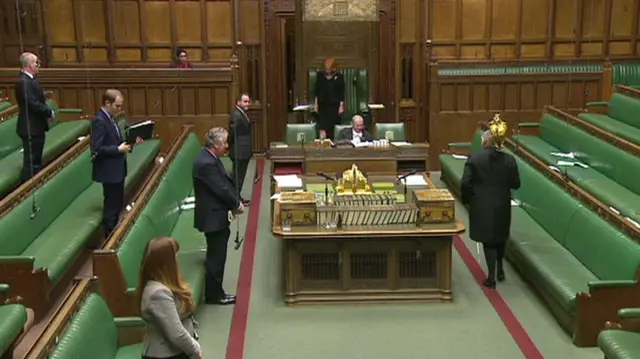 Image source, HoC
Image source, HoCThe debate concludes and that ends the day in the House of Commons.
MPs return tomorrow at 11:30am for questions to the Justice Secretary Liz Truss followed by debate of the Children and Social Work Bill.
Higher Education and Research Bill
 House of Lords
House of Lords
Parliament
Peers vote 140 to 45 against a Labour amendment which would have given the Office for Students the power to restrict enrolments if the OfS has reasonable grounds for believing that a registered higher education provider is in breach of an ongoing registration condition with respect to the quality of the higher education offered by the provider.
Parkinson's disease debate
 House of Commons
House of Commons
Parliament
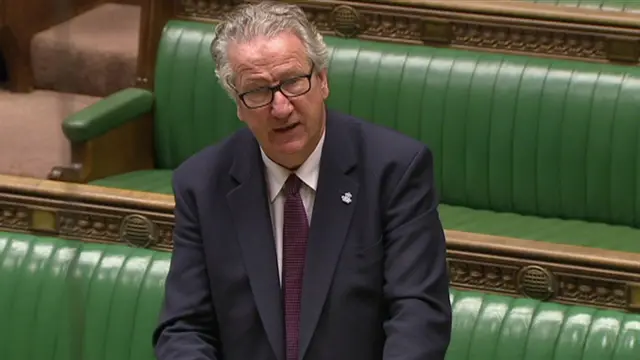 Image source, HoC
Image source, HoCHealth Minister David Mowat responds to the debate.
He says that there is an issue with diagnosing Parkinson's in young people because of an an "assumption that if you are young and have dizziness" that is symptomatic of more "benign problems".
We are going to find a cure through research, he says, and tells MPs that spending on neurology has increased from £30m to £55m in past five years.
Concerning Personal Independence Payments, he notes that the government's green paper on welfare, external proposed removing assessments for those with progressive diseases such as Parkinson's.
Higher Education and Research Bill
 House of Lords
House of Lords
Parliament
Peers are voting on a Labour amendment which would give the Office for Students the power to restrict enrolments if the OfS has reasonable grounds for believing that a registered higher education provider is in breach of an ongoing registration condition with respect to the quality of the higher education offered by the provider.
Higher Education and Research Bill
 House of Lords
House of Lords
Parliament
Labour's Lord Stevenson of Balmacara asks for more detail on the "range of opportunities for redress" available to the Office for Students if a university is in breach of registration conditions.
Education Minister Viscount Younger says the OfS would have "an escalating suite" of options but would only apply sanctions in "exceptional circumstances".
Parkinson's disease debate
 House of Commons
House of Commons
Parliament
Labour's Nick Thomas-Symonds raises the problem of accessing Personal Independence Payments for those with Parkinson's.
The difficulty, he says, lies in the fact that the severity of symptoms fluctuate.
Far too many people, he argues, have to go to a tribunal to get what they should have been given in the first place.
Higher Education and Research Bill
 House of Lords
House of Lords
Parliament
Peers resume report stage of the Higher Education and Research Bill.
Conservative Lord Carrington of Fulham introduces a "probing amendment" - that is, one which won't be pushed to a vote - concerning the "possibly unique" legal status of the Guildhall School of Music and Drama.
"This gives the problem that it is a body which doesn't really fit" into the definition of higher education institutions in the bill, he says.
But government spokesman Lord Young says the bill won't affect existing universities.
Parkinson's disease debate
 House of Commons
House of Commons
Parliament
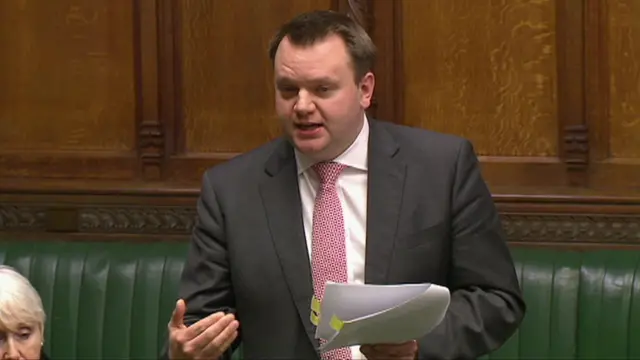 Image source, HoC
Image source, HoCLabour's Nick Thomas-Symonds quotes two constituents on being diagnosed with Parkinson's disease.
First, Gaynor: "I never felt quite so lonely, mourning for the future I thought I had, old before my time."
Secondly, Jordan: "The doctor kept saying I was too young and that it was a psychological problem".
Adjournment debate
 House of Commons
House of Commons
Parliament
MPs now begin the final item of business for the day - an adjournment debate on young-onset Parkinson's disease.
In Parkinson's disease, the brain is progressively damaged leading to tremors and difficulty moving.
There is no cure for the disease, but medication and brain stimulation can alleviate symptoms.
Those diagnosed before the age of 50 are considered to have young-onset Parkinson's.
Vehicle Technology and Aviation Bill
 House of Commons
House of Commons
Parliament
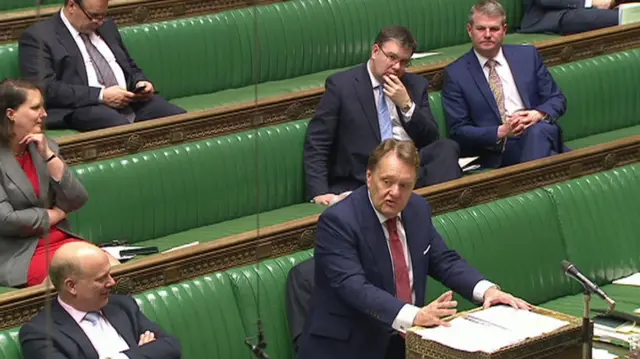 Image source, HoC
Image source, HoCTransport Minister John Hayes agrees with Richard Burden that no one, "least of all the opposition", wants to give the government "a blank cheque".
He says the new powers given to ministers in the bill should be open to parliamentary scrutiny.
On insurance and driverless cars, he says that it is "critical" that no one will be worse off in terms of liability.
He tells MPs that he was challenged to produce some poetry in his response and so concludes with some lines from T.S. Eliot's Four Quartets:
Time present and time past
Are both perhaps present in time future
And time future contained in time past
Assisted dying debate
 House of Lords
House of Lords
Parliament
Labour spokesman Lord Tunnicliffe tells peers that given MPs rejected legislation on assisted dying recently, the party will not push for more parliamentary time for the issue.
Ministry of Justice spokesman Lord Keen of Elie says even if there were a consensus on the need to legislate, there would be none on what form legislation should take.
It represents a "highly emotive and divisive" question, he adds.
Assisted dying debate
 House of Lords
House of Lords
Parliament
Tonight's debate on assisted dying is heavily subscribed, so speakers have been limited to one minute each.
A few highlights from crossbenchers' speeches:
Vehicle Technology and Aviation Bill
 House of Commons
House of Commons
Parliament
Shadow transport minister Richard Burden welcomes measures in the bill which would make distracting pilots with lasers an offence but regrets that the government hasn't included measures on the use of drones.
Automative cars offer huge benefits, he says, but also present challenges.
He says that the bill is seeking to "future-proof" legislation but argues that that this has led to ministers giving themselves "a blank cheque".
On electric cars, he calls for better public procurement of such vehicles and "the right consumer incentives".
In concluding, he says the bill is "worthwhile" but the government needs to do more to move the UK to "a low-emission future".
Assisted dying debate
 House of Lords
House of Lords
Parliament
Crossbencher and Paralympian Baroness Grey-Thompson discusses her fears over how facilitating assisted dying could devalue disabled people.
If the UK enacts such legislation, she warns "we are simply in the waiting room".
Assisted dying debate
 House of Lords
House of Lords
Parliament
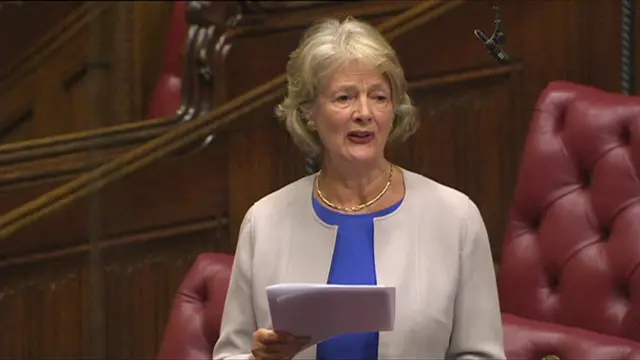
Labour's Baroness Jay of Paddington is opening a debate on recent legislation on assisted dying in North America, and whether those laws provide an appropriate basis for legislation in England and Wales.
She says things have "moved on significantly" there and in a comparatively "stable" way.
The approach pioneered in the US state of Oregon is "gentle and compassionate", she argues.